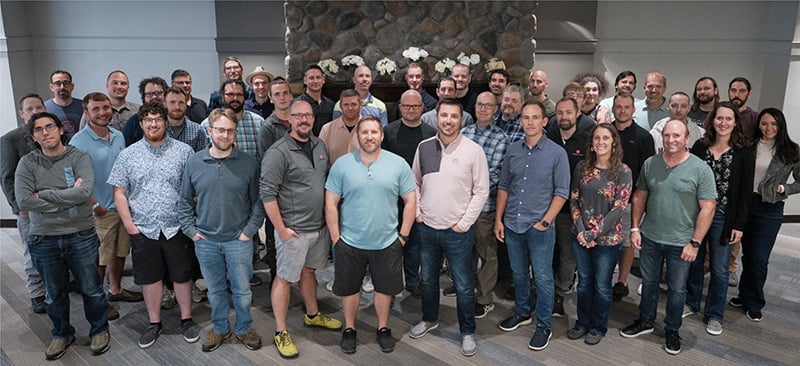In This Blog
- Why Translation Matters More Than Technology
- What Makes a Good Translator in Tech?
- The Role of Curiosity and Humility
- How Translation Prevents Tech Misfires
- Training Teams to Translate Better
- Emergent’s Secret Weapon: Technical Product Owners
- Final Thoughts
- FAQ
When I think about the skills that have made the biggest difference in my career, one stands out that doesn’t always get the recognition it deserves.
Translation.
And I don’t mean language translation. I mean the ability to understand a business problem, articulate it clearly, and turn it into a viable technical solution that actually delivers results. In my two decades leading data, software, and analytics teams across industries, from retail to health tech, this is the skill I keep coming back to. It's what separates strong technologists from great tech leaders.
Why Translation Matters More Than Technology
It’s tempting in tech to jump straight to the solution. New tools, architectures, or platforms can feel exciting, especially with the buzz around AI, LLMs, and other innovations. But no matter how powerful the technology, it’s useless if you don’t start with a deep understanding of the problem you’re solving.
I spend a lot of time upfront with our clients asking questions like:
-
What are you trying to answer?
-
What don’t you know today that you wish you did?
-
How would we measure success once the solution is live?
What Makes a Good Translator in Tech?
Good tech translators live at the intersection of business and technology. They bring perspective, empathy, and a commitment to clarity. They’re the ones asking questions, rephrasing what they hear, and making sure the entire team is aligned before anything gets built.
In my role, I intentionally over-index on the business side. I want to understand not just the systems in use, but the business processes, constraints, and goals. That’s what gives context to a solution. Without that, implementation becomes disconnected from value.
The Role of Curiosity and Humility
Curiosity is my most important skill. I ask a lot of questions, and I’m not afraid to ask the ones that may seem “too basic.” Shifting industries over the course of my career has helped with that. Even when I’m leading, I try not to assume I already know. When you admit what you don’t know, it opens the door for others to speak freely, too.
That kind of humility builds trust. And trust is essential if you want stakeholders, especially those outside of tech, to share what they’re really struggling with.
As a leader, I’ve also learned it’s not my job to have all the answers. It’s my job to create the space for the right questions. Most of the time, solutions emerge not from smarter code, but from clearer insight.
How Translation Prevents Tech Misfires
There’s no shortage of stories about failed projects where millions were spent, but no real business problem was solved. That disconnect often starts with a lack of translation.
I’ve seen the difference it makes when we slow down and listen. One client, for example, casually mentioned that weather affects their business. We dug deeper and realized they weren’t just talking about forecasts, they had no way to correlate historical weather with past business performance.
By proposing a solution that combined external weather data with their internal systems, we helped them separate controllable business variables from environmental ones. That kind of clarity changes how a business makes decisions. And it only came from listening well enough to hear what wasn’t said directly.
Training Teams to Translate Better
One of the best things you can do as a leader is model the behavior you want your team to adopt. I tell my teams: you have nothing to prove. Start with listening. Don’t lead with a proposed architecture or toolset. Lead with curiosity. Reframe what you’ve heard. Share relevant experience if you have it, but make sure you’ve earned the right to speak into the problem first.
Especially in distributed environments, where trust can take longer to build, the goal is to create a culture where asking questions is the norm, not a sign of weakness.
When I see teammates grow in this area, it’s often because they’ve realized that the best engineers and data professionals aren’t just technically skilled, they’re translators. They know how to uncover the real need behind the request.
Emergent’s Secret Weapon: Technical Product Owners
One thing that sets Emergent apart is our Technical Product Owners (TPOs). They’re the ultimate translators. I’ve led engagements both with and without TPOs, and the difference is night and day.
Our TPOs engage with genuine curiosity. They want to understand the “why” behind a request. And they’re skilled at working both sides of the aisle: going deep with engineers and architects, while staying in lockstep with business stakeholders. Their presence makes it easier to build solutions that work, because we’re solving the right problem from the start.
Final Thoughts
In all my years working in tech, I’ve realized how little success depends on the tools we use, and how much depends on the clarity we bring to the problem. Translation is foundational.
If you want to lead well in tech, get curious. Ask the extra question. Push for clarity. Stay humble. And spend less time proving what you know, and more time listening to what others need.
That’s where the real value lives.
FAQ
What does "translation" mean in tech leadership?
Translation in tech leadership refers to the ability to take complex, nuanced, or often loosely defined business challenges and convert them into clear, actionable technical direction. It’s about more than just “requirements gathering.” A strong translator doesn’t simply write down what a stakeholder says, they dig deeper to uncover what they mean, even if they’re not fully sure themselves. That could mean asking follow-up questions, reframing what was said, or drawing connections based on experience.
For example, a stakeholder might say, “We need better dashboards,” but what they actually need is to understand how their supply chain disruptions are impacting revenue over time. The translator’s job is to uncover that underlying need and guide the team to build a solution that gets at the real business question, not just deliver what was superficially requested.
Why is translation often overlooked as a leadership skill?
Because when it's done well, it’s practically invisible. Translation happens behind the scenes, before a line of code is written or a data pipeline is built. That makes it easy to undervalue. Companies may overemphasize certifications or technical frameworks, while underestimating how many failed or delayed projects trace back to miscommunication or misalignment.
It’s also a hard skill to quantify. You won’t see “skilled translator” listed on many resumes, even though it’s often the deciding factor between success and failure. When translation is missing, it shows up as rework, scope creep, missed deadlines, or solutions that don’t quite solve the problem. When it’s present, the work just flows, and everyone thinks the project was simply “well run.”
How can I become a better translator in my role?
Start by making curiosity your default posture. That means asking “why?” even when you think you know the answer, and being okay with not having all the answers yourself. Some of the most powerful moments I’ve had as a leader came from asking basic questions no one else wanted to ask out loud. Questions like:
-
“What problem are we solving with this?”
-
“How will we know when it’s working?”
-
“What would success look like in six months?”
Beyond curiosity, humility is key. If you walk into a room thinking you already understand the problem, you’re likely to miss the nuance. And finally, learn to actively listen. That includes paraphrasing back what you heard, validating assumptions, and being transparent about what you still need to understand. The more clarity you bring to the problem definition, the more effective your team will be in delivering a solution.
What role does translation play in data projects?
In data, translation is absolutely critical, because unlike traditional software builds, most data projects are decision support systems. That means their whole purpose is to help someone answer a business question or make a better decision. And you can’t build an effective system if you don’t first understand the question being asked.
Too often, data teams jump into source systems, schema design, or tool selection without ever stopping to ask: “What does the business need to know that it doesn’t know today?” The best data work happens when the team slows down, frames the right business questions, defines how success will be measured, and then designs the technical architecture to support that.
At Emergent, that’s our default mode of operation. We don’t start with, “Where’s your data?” We start with, “What are you trying to find out?” Once we know that, everything else becomes much easier to define.
How does Emergent Software support better translation?
One of the most effective ways we support translation is through our Technical Product Owners (TPOs). These aren’t traditional project managers or business analysts. They’re deeply technical professionals with a strong grasp of business needs, people who are naturally curious, communicative, and empathetic.
TPOs sit between the client and the technical delivery team, ensuring that no nuance is lost. They ask the follow-up questions others might skip. They probe to understand not just what’s being asked, but why, so we’re always solving the real problem, not just the stated one.
They also bring their own experience to the table. Our TPOs come from diverse backgrounds, and that perspective helps them draw connections, avoid pitfalls, and lead with insight. In my experience, they’re the secret sauce behind many of our most successful engagements. Without them, you’re at greater risk of building the wrong thing really well.





